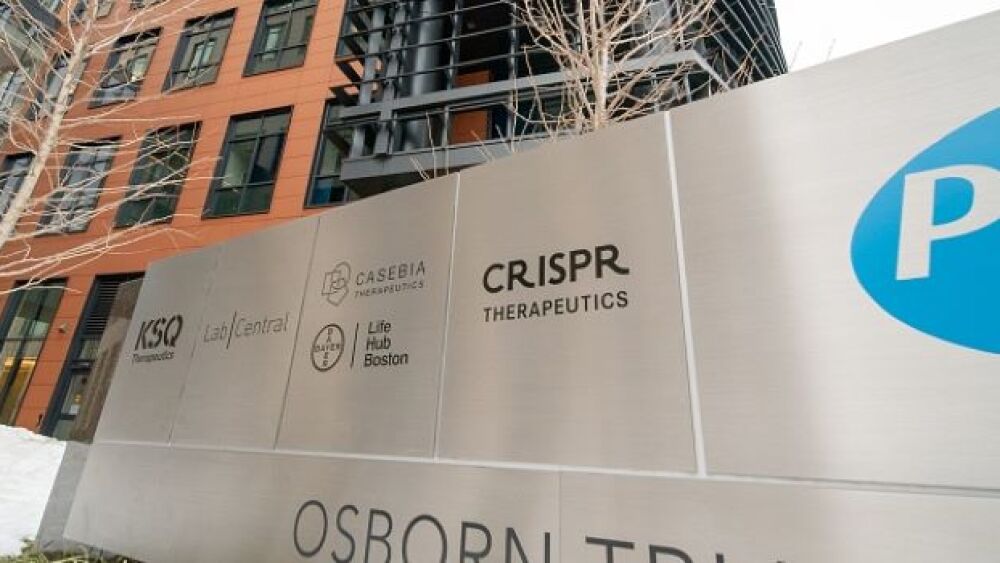CRISPR Therapeutics reported in its first-quarter financials, as of March 31, it had $2.221 billion in cash, cash equivalents and marketable securities to drive its progress.
Gado/Getty Images
CRISPR Therapeutics, which as its name suggests, is focused on using CRISPR-Cas9 gene editing to generate gene-based therapies for serious diseases, is expecting a busy year. And as reported in its first-quarter financials, as of March 31, it had $2.221 billion in cash, cash equivalents and marketable securities to drive its progress.
The company, along with collaboration partner Vertex Pharmaceuticals, expects to present updated data from its ongoing Phase III trials for CTX001 in transfusion-dependent beta thalassemia (TDT) and severe sickle cell disease (SCD). They had announced that more than 75 patients in both trials had been dosed last quarter. They have also initiated two new Phase III trials of the therapy in pediatric patients with TDT and SCD. They plan to submit global regulatory filings for CTX001 for those two indications later this year.
“I am pleased with the ongoing momentum across our broad portfolio of innovative gene therapy candidates and anticipate important company milestones in 2022,” stated Samarth Kulkarni, Ph.D., chief executive officer of CRISPR.
On February 2, CRISPR and ViaCyte dosed the first patient in a Phase I trial of VCTX210 for treatment of type 1 diabetes (T1D). VCTX210 is an allogeneic, gene-edited, stem cell-derived therapy designed to generate pancreatic cells that can evade recognition by the immune system. In theory, these replacement cells would allow patients to produce their own insulin.
“We are excited to work with CRISPR Therapeutics and ViaCyte to carry out this historic, first-in-human transplant of gene-edited, stem cell-derived pancreatic cells for the treatment of diabetes designed to eliminate the need for immune suppression,” said Dr. James Shapiro, M.D., Ph.D., Canada Research Chair, Director of the Islet Transplant Program at the University of Alberta, and a clinical investigator of the trial. “If this approach is successful, it will be a transformative treatment for patients with all insulin-requiring forms of diabetes.”
In addition to that trial, the company indicated in its quarterly report that based on progress with its in vivo techniques for liver gene editing using both viral and non-viral vectors, is expected to move multiple programs leveraging in vivo approaches into the clinic in the next 18 to 24 months.
CRISPR has also made inroads with its immuno-oncology programs. It is continuing to enroll and treat patients in the Phase III trial of CTX110, an allogeneic chimeric antigen receptor T cell (CAR-T) therapy targeting CD19+ B-cell malignancies. It expects to report additional data this year. And it also has ongoing Phase I trials for CTX-120, its wholly-owned allogeneic CAR-T therapy targeting B-cell maturation antigen for relapsed or refractory multiple myeloma, and CTX130, a CAR-T therapy targeting CD70 for solid tumors and certain hematologic malignancies. CRISPR Therapeutics expects to offer updates for both trials in the first half of this year.
Total collaboration revenue was $0.2 million for the first quarter of 2022 and 2021. For this quarter, R&D expenses were $118.2 million, up from $70.6 million in the same period last year. This was driven largely by its immuno-oncology programs and expenses associated with its new U.S. R&D headquarters. General and administrative (G&A) expenses were $28.0 for the first quarter, up from $24.5 million in the first quarter of 2021, driven by headcount-related expenses. Overall, it reported a net loss of $179.2 million for the first quarter.
Simply Wall St. conducted an analysis of CRISPR Therapeutics’ investors. It noted the company has a market capitalization of $3.7 billion, and usually a company this size would have a high percentage of institutional investors, which does seem to be the case with CRISPR. “This suggests some credibility amongst professional investors. But we can’t rely on that fact alone since institutions make bad investments sometimes, just like everyone does,” they write.
Institutional investors own more than half the issued stock that is not owned by hedge funds. The largest shareholder is ARK Investment Management, with 12%; the second largest, also with 12% of common stock, is Nikko Asset Management Col, and third, Capital Research and Management Company owns about 5.3% of the company stock.
In terms of the shareholders, 50% of ownership is controlled by the top 25 shareholders, “meaning that no single shareholder has a majority interest in the ownership.” Insider ownership makes up about $54 million in shares at current prices, while individual public investors hold a 35% stake. “While this size of ownership may not be enough to sway a policy decision in their favor, they can still make a collective impact on company policies,” writes Simply Wall St.
Kulkarni concluded, saying, “We believe we are well-positioned and well-capitalized to advance our pipeline and platform to develop transformative medicines for patients suffering from serious disease.”





